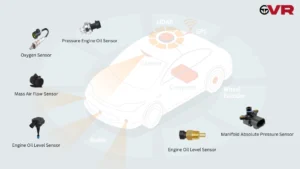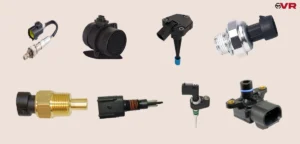Introduction of Car Sensors
Car sensor is electronic tools designed to sense a problem or obstruction in a car and notify the driver. These sensors change their performance to adapt to an event, making them vital in any modern car. As cars began to advance, their sensor applications spread from the engine location to almost every car operation. These sensors monitor various elements, such as oxygen and fuel intake, and help predict mechanical issues, making cars wiser and more responsive to potential threats to both the vehicle and its occupants.
Functions of Car Sensors
The car sensors basically “sense” and “monitor” the different parameters of the vehicle. The sensors pick up the data and transfer it to the ECS. The ECS, in turn, processes information through algorithms that point out correct action. These car sensors detect physical and chemical changes around them and convert these into electrical signals that keep the driver informed, thus actuating appropriate responses.

How Car Sensor Work
The sensors in the car function the same way sensory organs do us in humans. We can feel impending changes in our environment through our senses, and in the same way, any change that might prove fatal in the car is reported to us by the sensors, either within the car or on the road. Sensitivity increased with the extent to which the sensors were computerized by using algorithms, and now. we have got exactness. Giving a message to the vehicle’s central processing unit when a problem is detected, the CPU will communicate this to the driver using dashboard lights, screen alerts, or tones. Some systems can trigger automatic responses if immediate action is needed.
For example, the sensor for fuel levels supervises the quantity of fuel in the fuel tank and alerts the driver in times of need for refilling. It can also report abnormal fuel consumption to the driver, which further enriches the driving experience, especially for the models that use GPS-linked sensors.
Types of Car Sensor
Modern-day cars are equipped with numerous sensors to increase the detection ability for a safer and more comfortable road journey, on the other hand, it will enhance the vehicle’s overall life. Not every car will have all sensors, though 12 important types are used in almost every vehicle. These are:

- Oxygen Sensors: Its function is to measure the amounts of oxygen available in the exhaust system and modulate the air/fuel mixture to realize ideal engine performance.
- Mass Air Flow (MAF) Sensor: This is customized to determine and measure the amount of air entering an intake system, which helps the control unit of a car assess the right volume of fuel to inject. It functioned to detect over or under-inflation of tyres.
- Engine Oil Level Sensor: It functions to detect the level of engine oil in the engine. It gives a warning to the driver in case of low engine oil, thus preventing damage to the engine due to poor lubrication.
- Engine Oil Pressure Sensor: This sensor is customized to detect any excess or under pressure in engine oil This safeguards proper lubrication of the engine by monitoring the oil pressure and warning the driver in case it falls too low.
- Coolant Temperature Sensor: It is designed to monitor the coolant temperature of the engine, and input will be given to the driver so that the engine doesn’t cross the safe levels of temperature and overheat. It is functioned to prevent overheating.
- Coolant Level Sensor: This machine functions to sense when the coolant starts decreasing in level from the normal set level and gives a corresponding driver alert to make sure overheating does not occur.
- Air Intake Temperature Sensor: This is designed to measure the temperature of the air entering the engine. This allows better performance with improved fuel injection.
- Manifold Absolute Pressure (MAP) Sensor: The sensor’s main function is to measure the pressure within an engine manifold and, by doing so ensure correct fuel injection.
- Boost Pressure Sensor: In turbocharged or supercharged vehicles it measures pressure differences to fine-tune the engine’s performance.It mainly functions to boost the pressure to increase engine performance.
- Engine Knock Sensor: This sensor functions to detect the unusual vibrations of the engine, which could be an indication of knocking, and, if so, adjust the ignition timing to avoid further damage.
- Airbag Sensor: It functioned to examine the speed of the wheels, the force of impact, and other such factors to trigger airbags and change the position of seatbelts in the event of an accident.
- NOx Sensor: Its function is to regulate the emission of Nitrogen Oxide(NO). It controls the emissions and helps the vehicle meet environmental standards.
Conclusion
Car sensors become an irreplaceable part of the modern automobile setup, wherein the performance, safety, and comfort of various parts of the vehicle are measured and controlled to attain the best performance. From the engine sensor that helps to improve efficiency to the safety sensors that ensure driver protection, car sensors lie at the centre of the changes in automobile technology. As our vehicles advance, sensors will play an even bigger role when creating safer, smarter, and more environmentally friendly transportation.
Also Read: Types of Car Sensors
Frequently Asked Questions
Q. What are car sensors, and why are they important?
Ans. Car sensors are devices that monitor changes in the environment of a vehicle and help maintain optimal performance, safety and efficiency through monitoring of engine temperature, fuel levels among other critical parameters.
Q. How do car sensors improve safety?
Ans. Sensors such as airbags and anti-lock braking systems (ABS) are trained to sense danger and alert the driver or trigger protective actions like the deployment of an airbag when there is a crash.
Q. What happens if a car sensor fails?
Ans. When a sensor fails, it may cause suboptimal performance or compromises on safety. Most vehicles show a dashboard warning light indicating sensor problems.
Q. Can I replace a car sensor myself?
Ans. Certain types of sensors like oxygen sensors can be replaced by yourself while complex ones may require professional help for proper installation and calibration purposes.
Q. How often should car sensors be checked?
Ans. Sensors should undergo checks during regular service maintenance checks as most will last for years but when a fault occurs with the sensor itself then it should be changed quickly so that no problems arise in future.






Leave a Reply